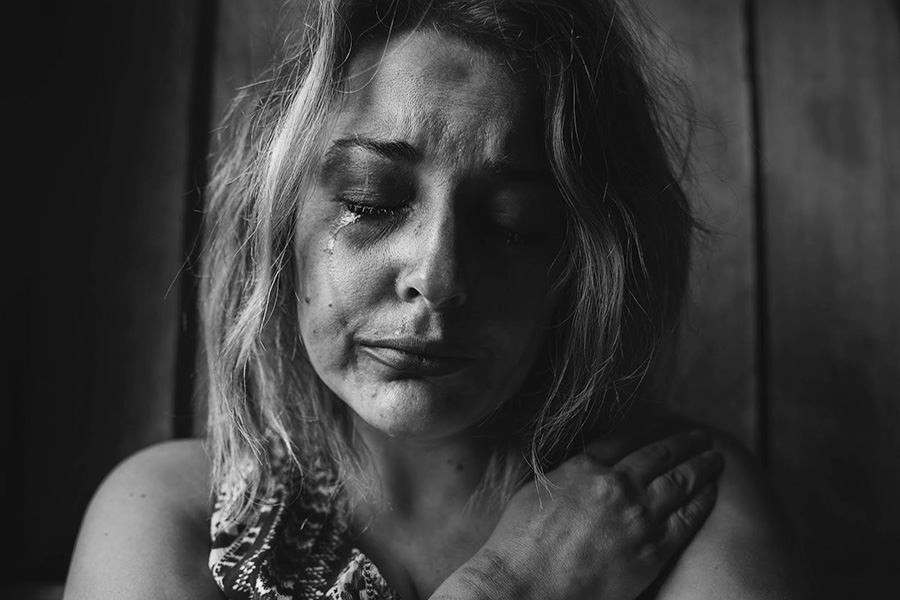Is your child struggling with addiction?
You're probably desperately searching for answers.
You've heard it all before -- but the advice you’ve been given doesn’t seem to work.
This is because most of the advice out there is wonderful and effective if your child has made the decision to choose recovery.
But what if your child has no interest in recovery? Or maybe they've tried rehab in the past and relapsed? Maybe over and over?
You've been by their side, listened to their requests, tried to help them in any way that you could. You’ve loved love them in the only way we've been taught.
But it was never enough.
Your love didn't stop their lies.
Your care didn't make them care.
Your support didn't stop them from using. And it seems like it only enabled them to keep hurting you, themselves, and others.
So what do you do when you're at the end of the rope and nothing works? When being loving seems to only spur on more conflict, manipulation, and pain?
I am the mother of an addict myself. I’ve dedicated myself to learning everything I could about loving and supporting an addict. Here’s what I want to share with you today.
I want to share with you how you can Love Another Way.
A way that is different from the Mom or Dad Code most of us operate under instinctively. It goes like:
“If your child is hungry, feed her. If your child needs a place to sleep, give him a bed. If your child needs x, help him or her with x in any way you can.”
Does that Mom or Dad Code Sound familiar? It was how I coped for years -- and it is how many of the parents I work with cope also. It’s part of who we are. It’s what we do as parents. And it doesn’t help our kids!
Addiction destroys families from the inside out
Addiction has become an epidemic. And addiction is largely misunderstood by most of us.
I have felt the shame, the anger, and the utter helplessness and hopelessness that comes with trying to love an addict. I have seen the same excruciating pain in others who have shared my struggle for years.
Their lives now revolve around one single question: “What can I do to stop my child from using? What can I do to help my child get back to living up to his or her potential?”
You may hear a lot about having compassion for the addict. And it’s true. Our addicted children need love, support, compassion. No one chooses to become an addict, and once they are, it is a hard climb out.
But, how exactly do you maintain compassion?
It’s hard to find useful information on exactly how to continue being loving, supportive and compassionate. The lies, deceit and manipulation just get in our way. It’s hard to tap into the kindness we want to show when we are blamed, treated meanly and taken advantage of over and over.
And you find little or no information on how to find that compassion and support for yourself.
And you must find that -- because you matter too. You are here also.
What I want to share with you is how you can take back your life. You can still behave lovingly with your child even after all the ways you’ve been hurt.
What parents of adult addicts should know

Once your child chooses recovery, they have an entire support network around them.
They can now talk about their struggles without being judged or ashamed.
On the other hand, the addict’s loved ones are often left behind.
They often suffer in silence.
Parents often have no one to talk to because no one really understands. They get blamed for enabling their children. They get blamed for falling for their lies over and over again. They have no one to talk to about their debilitating trust issues, shame, and depression.
I’ve learned so much through my own experience and through the experiences of so many other people.
And this is why I feel compelled to share what I’ve learned about how addiction impacts our lives.
Here are 7 things I've learned over the years that have helped me tremendously in my recovery:
1. You may feel empty and lost
One of the harsh truths addiction teaches you early on is that the person you once knew is gone. Once their deception is no longer effective, you may struggle to recognize them behind all the lies.
You may feel empty, betrayed, and scared all at the same time. The only thing you really want is to have the son or daughter you remember back. You don’t want that disease of addiction creeping in and stealing them from you again.2. You will never be the same person you once were
At first, you might be in disbelief of your child's addiction.
When the gravity of the situation sinks in, you may blame yourself.
Once the manipulation starts, you may doubt everything, including yourself.
When you uncover the truth, shame will kick in.
You may feel confused. You may be plagued with worry, constantly wondering if they're using again.
You might develop anxiety, suicidal depression or PTSD as a result. You may no longer be functional in your day-to-day life. You might struggle with sleeping, working or even leaving your bed.3. Your feelings are normal and valid
I’ve been through everything that’s described above. And so have many other parents of adult addicts.
You may likely feel incredibly isolated and misunderstood. I promise you that you're not alone in your pain. Everything you are feeling is a normal reaction to what you have been through. There are others who understand.4. Addicts only choose recovery when they are in unbearable pain; not when others around them are suffering.
This was probably the hardest lesson that I’ve had to swallow on my journey to recovery.
It boils down to this. An addict will only choose recovery when the pain of remaining in the addiction is greater than whatever benefit they get from using their drug of choice or drinking. This view is supported by many of the recovery professionals I’ve worked with and by almost everyone in recovery I’ve ever spoken with.
Pain can come from homelessness, loss of access to children, loss of a job, hunger, and on and on. Pain can come from a combination of these and other factors. Or, the combined pain of all of these things together may not be enough. It is impossible to know.
Unfortunately, someone in addiction is unable to care about the pain of anyone else. Oh, they may have moments of clarity here and there. And almost always these moments of clarity fade. And the addiction asserts its demands.
Personal pain must be greater than the benefit their substance provides. Only then can the individual choose to take genuine & consistent action toward recovery.
You need to understand this. This is why you cannot save your child. Your child must have a genuine desire to choose recovery. Without that and no matter what you do, nothing will change for long. No matter how much you wish otherwise.
5. Your trust will be completely shattered
Parents of addicts bear the burden of hearing lie after lie, untruth after untruth. It’s debilitating for the parent. This can crush any sense of trust you have in others or in yourself. After all, it was the trust that you granted your child that enabled their usage so many times in the past. And almost always your child will continue to use your trust against you to get what they want. This disease is one of manipulation.
I'm not here to tell you to trust or not trust your child. Rather, I encourage you to educate yourself on addiction. Get clear in your head and your heart on how addiction really behaves from the addict’s point of view. This helps you avoid making any rushed decisions out of guilt or misguided love.
6. You will have to find new ways of communicating

I know this sounds harsh, and still I need to say it. Giving in to your parental instincts often backfires when dealing with an addict.
That Mom Code or Dad code works so very well when you are parenting a non-addicted child. And that same Mom or Dad Code fails miserably once your child is in addiction or has a mental health issue.
Kindness, blind trust, and guilt will most likely be used against you and so you will give in to their demands.
It’s a vicious cycle.
They are not really feeling all of their own pain. You are absorbing it. And an addict will not choose recovery because someone else is in pain.
As painful as it will be, you need to stop enabling your child if you want them to have a chance to choose recovery.
What that means is personal to each person and family. And what that means usually happens in micro-steps over time. An experimentation process.
The list goes on and on and is as varied and personal as each family.
These are the types of actions that enable the addiction less and less. And each of them can be taken in a loving, supporting way, which is different than giving in.
These are the types of actions that help your child. These types of actions allow your child to choose recovery for themselves.
And if your child chooses recovery, you will be there for them to support and love them during that process.
And through it all this you will be there, loving your child. You will just be Loving Another Way, instead of under the Mom or Dad code.
7. You can overcome this pain and feel at peace
My son, Eric, slipped into psychosis after using hard drugs for several years.
I could no longer feel the ground beneath my feet.
I was devastated.
After his countless relapses, failed promises and lies, I was broken as a person.
If someone had told me then that I would recover, I would never have believed them. Yet there I was, some years later, at peace and living my own life. I recovered years before my son Eric chose recovery for himself.
And Eric tells me that my recovery is what allowed him to finally choose recovery for himself.
I know your own recovery may seem impossible to you. And in a sense, it is. You will never go back to being the person you were before addiction entered your world. This experience has fundamentally changed you as a person.
But you will be able to feel peace, relief, and even joy again.Peace is possible for both of you

Your child may be in recovery, or actively using, or in mental illness, or you just aren’t sure.
You can still find peace. You can move from crippled by anxiety, guilt, and shame. You can be in a place where the quality of your day is independent of the quality of your child’s day.
And there is something beautiful in how this all works. Once you get to this place of peace, you are far better equipped to cope with your child's hurtful actions. You are able to behave in a way that truly helps your child choose recovery for him or herself.
You will be able to respond lovingly to their behavior but also remain aligned with your own values. You will be able to support them without enabling them. You will be able to show your compassion and love while still looking after your own needs.
You will finally be able to love them and yourself in a way that allows both of you to find peace. You will be Loving Another Way.
If this insight is useful to you, please click here to take a listen to my free confidential webinar, where I share expert advice and my own experience loving an addicted child.
I felt all these things that nobody tells you about loving an addict. For more of my story, how I helped my son, and how thousands of Mom are helping their children, hop on my workshop
Free, confidential, 60 minutes.
I work side by side with parents on finding new coping strategies that help them regain control of their lives and also create real opportunities for their children to choose recovery.

I hope you find a pocket of joy in your day today.
Reach out anytime, because I care.
Barbara
Certified Family Recovery Specialist (CFRS)

This write up was helpful. My son chose recovery and in the rehab. He is almost out of rehab.
So excellent. Thanks for sharing, Violet
I am so tired of my 29yo son's verbal abuse, financial abuse, emotional abuse, lies, manipulation, attacks, and never-ending chaos. My husband enabled our son's behavior long after I'd had enough. Ive shrunk into a shell of who I might be while enduring this misery. At this point, sadly, i wonder if it may be easier to grieve a death than continuing like this. I feel sick, sad, disappointed, angry, frustrated, hurt, very hurt by the way my son treats me.
Christy – It is hard for sure and I’m sorry you are dealing with this. You do have the power, though, to make changes that will protect you from abuse of any kind and remove the chaos from your live. We can help if you are interested in our help. -B
my as is 43 years old used opiates fentanyl heroin for the last 18 years and meth ten before that he is menatally ill from addiction or was it there before i will never know we raised his daughter and he has twins the other gma is raising she is 71 years old and still working as a reg.nurse. this journey has me wore down i refuse to go to him when he ods because he just gets bak up and goes back to the drug house he is psychotic paranoid schizophrenia I have been following you for the last year and have had continued therapy on how to mourn a living child So Very painful still not at peace just hurts all the family i have stopped giving him money clothing food and etc the only thing i will do is feed him when he comes here and let him shower he is homeless and let him come in after i have hid everything of value i the house thank you for not lettingme feel alone
Sabrina – I am so sorry for what you are enduring. You and the other grandma are angels for those grandkids. And you are truly not alone -there are so many of us out there. I hope you find some peace and time for yourself because you deserve it. -B
I really needed this reminder today
I know I’m slipping into letting my AS take me down with him.
Even though I know better.
Not in a good head space lately
Thank you for all of the reminders
Thank you for all you do
Liza – We all have bad days – bad head space days. And I encourage you to allow yourself to mope and have a bad head space day and eat bon bons and watch netflix if you want. And then when you are ready, pick yourself on up and start again. We need to grieve the loss of what we expected to exist, what we worked hard for. No shame in that. -B
Thank you for this amazing insight on addiction. I wrote it all down for further reference. I am still hopeful things will change and try to have a good day anyway. We did all we could..and I keep praying for our sons recovery. God bless you.
You are very welcome Amy. It’s such a devastating disease and it sounds like you are in a good place yourself and taking care of you. Well done. -B
thank you for being there, I am ready!
You are welcome and we are so glad you are here, Pauline. -B
I love the idea of “love another way”. I’m willing and ready to learn and practice. 🤞. We’ve been at this for years I’m at the end of new ideas. Thank you for being there
Hi Connie – I get it – the at it for years part. This is a life-long disease, a marathon and certainly not a sprint. Good for you being open minded and solution-oriented. A warrior. -B
This really helped me, its been 12 years loving ( and many of them enabeling) my 30 yr old son with M.H & alcoholism/ addiction. I have just in the last 2 years done much more of the non – enabeling responses you've listed. Thank you for talking about how the parents of the addicts never get support and are never listened to I have been thinking about writing something about this on my own because it is definitely a huge problem and rehabs do not incorporate All of the issues and the permanent damage that occurs in our lives.
Thanks so much, Belinda, for your note. I think many of us moms have our own PTSD after years of dealing with the trauma mind diseases and addiction take on us and our families. -B
Thank you for all of the advice you’ve given. My son is 38 and has been an alcoholic for the past 20+ Years. He is critically ill with liver issues and has stopped drinking. He has never been to rehab and refuses any outside help. I am praying that he doesn’t relapse again. Any advice you could give me would be very appreciated.
Hi Louise, I’m sorry to hear that your son is critically ill – this sounds like a very difficult situation. I can’t give advice on a blog post; There is just no one right answer. Every situation is different, every person is different, the approach which is best for each person is different.
I do coach students around these situations in my VIP program. If you are interested in that program, please take a listen to the webinar (link at the top of my website, any page) for the full scoop.
Barbara
Thank you .the husband and me recently said what about the parent what and who is there for the parent during all this. I’m a mom of an addict who gets up and starts over each time she falls but after so long g a parent can’t seem to accept ill try again.we are tired. We hurt. We now have a daughter who doesn’t speak to us because we chose peace over listening daily what she will do this time. Not that I’m not here to support her but I figured it’s time after repeat of the same thing almost daily I had to make changes and that’s where I said I’m here if ya need me but try to understand why I’m angry its been a long haul for us both but she seems to think it’s about her recovery not what hurts me inside Thanks Barbara for tour post .I see I didn’t make the wrong decision by asking her what about us as the parenrs..even though she got angry and hasn’t spoke to me in 2 weeks for that statement to her
Thanks for your note, Melissa. It is sometimes hard to do what we need to do for ourselves. I did learn though that my picking my son up and ignoring my own needs didn’t actually help him to grow the resiliency and resources he needed to build his own life. -Barbara
Thank you Barbara!
You are welcome, Kathy.
I need help ..
Shirley – That’s what we do here. We have programs to help moms in this situation. Please watch the workshop. You can find the link at the top of this page. Because most of us cannot do this alone. Hope to meet you. Barbara
Thanks for your work
Susan – you are very welcome.
My grandson is trying to help his mother go through this she is or was doing since my son died of the use of drugs. would this site help him?
Hi Margaret,
I’m not sure. I work with the individual who wants to change his/her own behavior. So, if your grandson is trying to change his own behavior, then yes, probably. If you are asking if this will help him change his mother’s behavior, then probably not. Because each of us can change exactly one person. That one person is us. When we try to change another person, we get enmeshed in ways that harm both us and that other person. Barbara
A new perspective, this Mom/dad code impact. Thanks for sharing this insight on how it can be enabling to addicted children.
Thank you, LaurieB, for taking the time to leave a comment.
Very informative and great insights
Thank you.